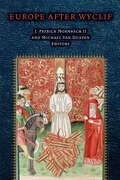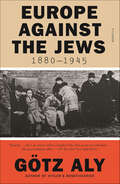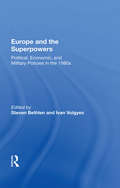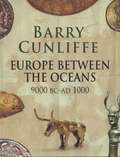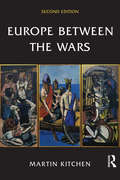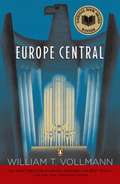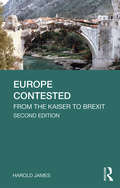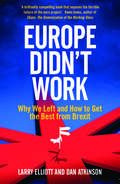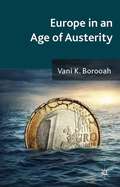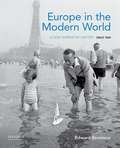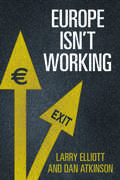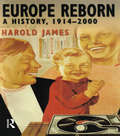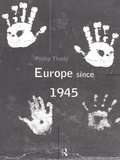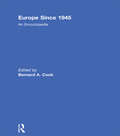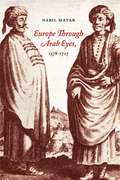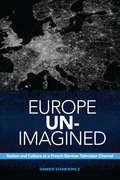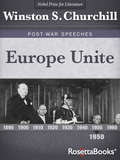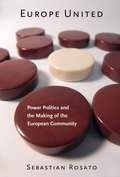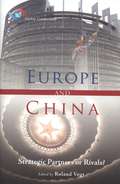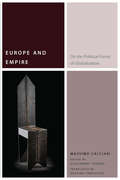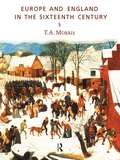- Table View
- List View
Europe After Wyclif (Fordham Series in Medieval Studies)
by J. Patrick Hornbeck II and Michael Van DussenThis volume brings together scholarship that discusses late-medieval religious controversy on a pan-European scale, with particular attention to developments in England, Bohemia, and at the general councils of the fifteenth century. Controversies such as those that developed in England and Bohemia have received ample attention for decades, and recent scholarship has introduced valuable perspectives and findings to our knowledge of these aspects of European religion, literature, history, and thought.Yet until recently, scholars working on these controversies have tended to work in regional isolation, a practice that has given rise to the impression that the controversies were more or less insular, their significance measured in terms of their local or regional influence. Europe After Wyclif was designed specifically to encourage analysis of cultural cross-currents—the ways in which regional controversies, while still products of their own environments and of local significance, were inseparable from cultural developments that were experienced internationally.
Europe Against the Jews, 1880–1945
by Götz AlyFrom the award-winning historian of the Holocaust, the first book to move beyond Germany’s singular crime to the collaboration of Europe as a whole.The Holocaust was perpetrated by the Germans, but it would not have been possible without the assistance of thousands of helpers in other countries: state officials, police, and civilians who eagerly supported the genocide. If we are to fully understand how and why the Holocaust happened, Götz Aly argues in this groundbreaking study, we must examine its prehistory throughout Europe. We must look at countries as far-flung as Romania and France, Russia and Greece, where, decades before the Nazis came to power, a deadly combination of envy, competition, nationalism, and social upheaval fueled a surge of anti-Semitism, creating the preconditions for the deportations and murder to come.In the late nineteenth century, new opportunities for education and social advancement were opening up, and Jewish minorities took particular advantage of them, leading to widespread resentment. At the same time, newly created nation-states, especially in the east, were striving for ethnic homogeneity and national renewal, goals which they saw as inextricably linked. Drawing upon a wide range of previously unpublished sources, Aly traces the sequence of events that made persecution of Jews an increasingly acceptable European practice. Ultimately, the German architects of genocide found support for the Final Solution in nearly all the countries they occupied or were allied with.Without diminishing the guilt of German perpetrators, Aly documents the involvement of all of Europe in the destruction of the Jews, once again deepening our understanding of this most tormented history.Praise for Europe Against the Jews 1880-1945“A masterpiece.” —Die Zeit“If HBO’s The Plot Against America makes you want to know the grim real-life context, read German historian Götz Aly’s new book, Europe Against the Jews.” —New YorkMagazine“A major work on anti-Semitism of incredible research and singular scholarship. . . . Aly delivers again, this time expanding his lens outside of Germany to offer further revelations about the Holocaust.” —Kirkus Reviews
Europe And The Superpowers: Political, Economic, And Military Policies In The 1980s
by Steven Bethlen Ivan VolgyesRelations between the superpowers and the nations of Eastern and Western Europe are especially tenuous as the midpoint of the 1980s approaches. The contributors to this volume assess the current political, economic, and military dimensions of Europe’s international relations and consider the prospects for change, focusing on the role of the rival alliance systems (NATO and the Warsaw Pact), Soviet conceptions of the future of Europe, U.S. goals concerning the maintenance of NATO, and Europe’s assessment of its own interests and objectives. The book concludes by addressing the impact of Soviet and East European domestic developments on present and future East-West relations.
Europe Between the Oceans: 9000 BC to AD 1000
by Barry CunliffeIn this magnificent book, distinguished archaeologist Barry Cunliffe reframes our entire conception of early European history, from prehistory through the ancient world to the medieval Viking period. Cunliffe views Europe not in terms of states and shifting political land boundaries but as a geographical niche particularly favored in facing many seas. These seas, and Europe's great transpeninsular rivers, ensured a rich diversity of natural resources while also encouraging the dynamic interaction of peoples across networks of communication and exchange. The development of these early Europeans is rooted in complex interplays, shifting balances, and geographic and demographic fluidity. Drawing on archaeology, anthropology, and history, Cunliffe has produced an interdisciplinary tour de force. His is a bold book of exceptional scholarship, erudite and engaging, and it heralds an entirely new understanding of Old Europe.
Europe Between the Wars
by Martin KitchenMartin Kitchen’s compelling account of Europe between the wars sets the twenty-year crisis within the context of the profound sense of cultural malaise shared by many philosophers and artists, the economic crises that plagued a Europe ruined by war and the social upheavals caused by widespread unemployment and grinding poverty amid a noticeable improvement of living standards. This thoroughly revised edition, with completely new sections on intellectual, cultural and social history is richly illustrated with contemporary photographs. It is an up-to-date and lively account of a critical period of European history when the old world collapsed, the dictators offered seemingly exciting alternatives, and democracies were put to the supreme test. Written for undergraduate students studying 20th century European history, this new edition of a classic will challenge and provoke a deeper understanding of the interwar years.
Europe Central
by Vollmann William T.In this magnificent work of fiction, William T. Vollmann turns his trenchant eye to the authoritarian cultures of Germany and the USSR in the twentieth century. Assembling a composite portrait of these two warring leviathans and the terrible age they defined, the narrative intertwines experiences both real and fictional: a young German who joins the SS to expose its crimes, two generals who collaborate with the enemy for different reasons, the Soviet composer Dmitri Shostakovich laboring under Stalinist oppression. Through these and other lives, Vollmann offers a daring and mesmerizing perspective on human actions during wartime.<P><P> Winner of the National Book Award
Europe Central
by William T VollmannIn this magnificent work of fiction, acclaimed author William T. Vollmann turns his trenchant eye on the authoritarian cultures of Germany and the USSR in the twentieth century to render a mesmerizing perspective on human experience during wartime. Through interwoven narratives that paint a composite portrait of these two battling leviathans and the monstrous age they defined, Europe Central captures a chorus of voices both real and fictional— a young German who joins the SS to fight its crimes, two generals who collaborate with the enemy for different reasons, the Soviet composer Dmitri Shostakovich and the Stalinist assaults upon his work and life.
Europe Contested: From the Kaiser to Brexit (Longman History of Modern Europe)
by Harold JamesEurope Contested analyses the failures and achievements of an astonishing era of economic advance and political chaos, from the First World War up to the present day. Beginning with the Great War, the book goes on to examine connections between the self-destruction of liberal democracy, market economics, and the international political and security framework in the interwar period. It then considers the mass politics that surrounded the glorification of new-style leaders Lenin, Stalin, Mussolini, and Hitler before moving on to explore the ways in which the interwar legacy was superseded post-1945. James examines the deceptive appearance of stability brought by a new convergence in European politics that focused around the market and the principle of liberal democracy, and demonstrates how the impact of globalization and openness to migration and to destabilizing financial capital flows has eroded traditional politics and ended the stable left-right polarization at the core of the postwar order. This new edition has been thoroughly updated throughout, demonstrating also how an era of crisis is challenging Europe and its values. Supported by boxed case studies, illustrations, chronologies and an annotated bibliography, and focusing on Europe as a whole, it is the perfect introduction for students of Modern European History.
Europe Didn't Work: Why We Left and How to Get the Best from Brexit
by Larry Elliott Dan AtkinsonA timely and provocative account of why the euro has failed and why, as a result, the Union will unravel Examining key economic indicators and assessing the situation across Europe, two British journalists assess why the euro has failed—and what will happen when the European Union completely unravels. “This book is a must-read for anyone who cares about the future of Europe and progressive politics. Larry Elliott and Dan Atkinson correctly predicted the euro would prove a calamity. They are right today that the euro crisis is far from over. Their demand for a radical change of approach must be taken seriously—by policy makers and politicians alike.”—Ed Balls, UK Shadow Chancellor from 2011 to 2015 “[The book] offers useful insight into why so many people thought the euro was a good idea in the first place.”—Harvard Business Review
Europe In An Age Of Austerity
by Vani K. BorooahThis study discusses and analyses the broad issues that have underpinned the current European economic crisis. It examines the experiences of three countries - Greece, Ireland, and Portugal - which reveal an economic system which lacks the adjustment mechanisms that countries with sovereign currencies take for granted.
Europe In The Modern World: A New Narrative History, Since 1500
by Edward BerensonEurope in the Modern World: A New Narrative History Since 1500 is an unusually engaging narrative history of Europe since 1500. Written by an award-winning teacher and scholar, the narrative highlights the major episodes of the European past and vividly connects those episodes to major international events. Each chapter opens with a compelling biographical sketch--from Toussaint Louverture to Leni Riefenstahl--that gives the book's ideas a vibrant, human face, while "Writing History" exercises at the end of each chapter offer students step-by-step guidance toward effective, polished prose. Taken together, the end-of-chapter exercises constitute a powerful expository writing program unique to this book. Europe in the Modern World pays considerably more attention to economic history than do other textbooks, demonstrating the role that economic developments--and the political, social, and cultural responses to them--play in shaping the political and social life of a given age. By taking politics and economics seriously while doing justice to social and cultural life, Europe in the Modern World explains the key phenomena of the Western past with clarity and verve. The book reads not like a typical academic text, but more like the best narrative history.
Europe Isn't Working
by Larry Elliott Dan AtkinsonA timely and provocative account of why the euro has failed and why, as a result, the Union will unravel Europe's center-left is rapidly falling out of love with the European single currency. Fifteen years after its creation, British journalists Larry Elliott and Dan Atkinson assess its performance to show why. Looking at a range of key indicators the authors show how the euro has failed to deliver on its promise of more jobs, more growth and greater equality. Instead it has undermined the European Union. Elliott and Atkinson compare the European Central Bank to the Federal Reserve, arguing that the architects of the euro subjugated economic measures to political considerations. Consequently, countries that didn't meet the economic convergence criteria were still allowed entry. The end result is a dysfunctional currency union that is unable to cope with difficult economic circumstances. Assessing the situations in Greece, Germany, Italy, France, Ireland, and Iceland, as well as Britain, they show that the current policy of kicking the can down the road and hoping that something will turn up is proving increasingly unpopular with the currency's one-time fans in progressive politics. This engaging and accessibly written volume will be widely read by economists, pundits, and policymakers as Britian considers its future relationship with Europe.
Europe Reborn
by Harold JamesIn the early twentieth century brutal nation-states such as Mussolini's Italy, Stalin's Russia and Hitler's Germany came to the fore and the twin evils of dictatorship and war ensured the rapid destruction of liberal democracy, market economics and the international order. In contrast, the latter half was concerned with re-thinking and re-shaping these core values which still guide political life after the millennium. Harold James analyses the failures and achievements of the twentieth century. The demands of the post-war period, namely the place of Europe in a wider international order are also examined. Features include: Boxed Case Studies Maps Plates Figures Short Biographies Chronologies Statistical Appendix James lucidly argues that European societies today are dominated by the trend to converge around the principles of democracy, market economics and international integration. He shows that the stability brought by the gradual unwinding of the nation-state and the end of left-right politics have created a Europe 'reborn'.
Europe Since 1945
by Philip ThodyEurope Since 1945 is an exciting new survey of the history of Europe since the end of World War Two. In the second half of the twentieth century Europe has known a period of peace and stability unprecedented in its history and virtually unparalleled in the rest of the world. Europe explains the reasons for this state of affairs.Thought- provoking and wide ranging, this book discusses political, economic, social and cultural change in modern Europe. Covering both Western and Eastern Europe comprehensively and featuring extensive analysis of the 1990s, this book includes examination of:* the Cold War* War at the edges - Northern Ireland and Yugoslavia* the European Union* the issues of Nationalism* the end of the dictatorships* economic prosperity, the EEC and the Euro* the break-up of the European Empires and the consequences.
Europe Since 1945: An Encyclopedia
by Bernard A. CookEurope Since 1945: An Encyclopedia is a comprehensive reference work of some 1,700 entries in two volumes. Its scope includes all of Europe and the successor states to the former Soviet Union. The volumes provide a broad coverage of topics, with an emphasis on politics, governments, organizations, people, and events crucial to an understanding of postwar Europe. Also includes 100 maps and photos.
Europe Speaks Arabic
by Dr V. Abdur RahimArabic gave Europe cotton to wear, candy to eat, coffee to drink, chess to play, magazine to read, mattress to sleep on, and sugar to sweeten with. This book is a lucid exposition of these and a host of other Arabic words that have become part and parcel of English and other European languages. It is not a catalogue of words, but a lively discussion based on linguistic evidence, enriched with copious literary quotations and characterized by profound regard and respect for each other's culture and views. The book opens up new worlds of fascinating information in the domains of etymology, phonetic change and semantic development. It uses English, French, Spanish, German and other languages to show how words have been derived from Arabic.
Europe Through Arab Eyes, 1578-1727
by Nabil MatarTraveling to archives in Tunisia, Morocco, France, and England, with visits to Egypt, Jordan, Lebanon, and Spain, Nabil Matar assembles a rare history of Europe's rise to power as seen through the eyes of those who were later subjugated by it. Many historians of the Middle East believe Arabs and Muslims had no interest in Europe during this period of Western discovery and empire, but in fact these groups were very much engaged with the naval and industrial development, politics, and trade of European Christendom. Beginning in 1578 with a major Moroccan victory over a Portuguese invading army, Matar surveys this early modern period, in which Europeans and Arabs often shared common political, commercial, and military goals. Matar concentrates on how Muslim captives, ransomers, traders, envoys, travelers, and rulers pursued those goals while transmitting to the nonprint cultures of North Africa their knowledge of the peoples and societies of Spain, France, Britain, Holland, Italy, and Malta. From the first non-European description of Queen Elizabeth I to early accounts of Florence and Pisa in Arabic, from Tunisian descriptions of the Morisco expulsion in 1609 to the letters of a Moroccan Armenian ambassador in London, the translations of the book's second half draw on the popular and elite sources that were available to Arabs in the early modern period. Letters from male and female captives in Europe, chronicles of European naval attacks and the taqayid (newspaper) reports on Muslim resistance, and descriptions of opera and quinine appear here in English for the first time. Matar notes that the Arabs of the Maghrib and the Mashriq were eager to engage Christendom, despite wars and rivalries, and hoped to establish routes of trade and alliances through treaties and royal marriages. However, the rise of an intolerant and exclusionary Christianity and the explosion of European military technology brought these advances to an end. In conclusion, Matar details the decline of Arab-Islamic power and the rise of Britain and France.
Europe Through Arab Eyes, 1578–1727
by Nabil MatarTraveling to archives in Tunisia, Morocco, France, and England, with visits to Egypt, Jordan, Lebanon, and Spain, Nabil Matar assembles a rare history of Europe's rise to power as seen through the eyes of those who were later subjugated by it. Many historians of the Middle East believe Arabs and Muslims had no interest in Europe during this period of Western discovery and empire, but in fact these groups were very much engaged with the naval and industrial development, politics, and trade of European Christendom. Beginning in 1578 with a major Moroccan victory over a Portuguese invading army, Matar surveys this early modern period, in which Europeans and Arabs often shared common political, commercial, and military goals. Matar concentrates on how Muslim captives, ransomers, traders, envoys, travelers, and rulers pursued those goals while transmitting to the nonprint cultures of North Africa their knowledge of the peoples and societies of Spain, France, Britain, Holland, Italy, and Malta. From the first non-European description of Queen Elizabeth I to early accounts of Florence and Pisa in Arabic, from Tunisian descriptions of the Morisco expulsion in 1609 to the letters of a Moroccan Armenian ambassador in London, the translations of the book's second half draw on the popular and elite sources that were available to Arabs in the early modern period. Letters from male and female captives in Europe, chronicles of European naval attacks and the taqayid (newspaper) reports on Muslim resistance, and descriptions of opera and quinine appear here in English for the first time. Matar notes that the Arabs of the Maghrib and the Mashriq were eager to engage Christendom, despite wars and rivalries, and hoped to establish routes of trade and alliances through treaties and royal marriages. However, the rise of an intolerant and exclusionary Christianity and the explosion of European military technology brought these advances to an end. In conclusion, Matar details the decline of Arab-Islamic power and the rise of Britain and France.
Europe Un-Imagined: Nation and Culture at a French-German Television Channel
by Damien StankiewiczEurope Un-Imagined examines one of the world’s first and only trans nationally produced television channels, Association relative à la télévision européenne (ARTE). ARTE calls itself the "European culture channel" and was launched in 1991 with a French-German intergovernmental mandate to produce television and other media that promoted pan-European community and culture. Damien Stankiewicz’s ground-breaking ethnographic study of the various contexts of media production work at ARTE (the newsroom, the editing studio, the screening room), reveals how ideas about French, German, and European culture coalesce and circulate at the channel. He argues that the reproduction of nationalism often goes unacknowledged and unremarked upon, and questions whether something like a European "imagination" can be produced. Stankiewicz describes the challenges that ARTE staff face, including rapidly changing media technologies and audiences, unreflective national stereotyping, and unwieldy bureaucratic infrastructure, which ultimately limit the channel’s abilities to cultivate a transnational, "European" public. Europe Un-Imagined challenges its readers to find new ways of thinking about how people belong in the world beyond the problematic logics of national categorization.
Europe Unite (Winston S. Churchill Post-War Speeches #2)
by Winston S. ChurchillThe second volume in this collection of the prime minister&’s oratory contains the post-war speeches that stoked patriotic fire in the waning days of Empire. Legendary politician and military strategist Sir Winston Churchill was a master not only of the battlefield, but of the page and the podium. Over the course of forty books and countless speeches, broadcasts, news items and more, he addressed a country at war and at peace, thrilling with victory but uneasy with its shifting role on the global stage. In 1953, he was awarded the Nobel Prize for Literature for &“his mastery of historical and biographical description as well as for brilliant oratory in defending exalted human values.&” During his lifetime, he enthralled readers and brought crowds roaring to their feet; in the years since his death, his masterful writing has inspired generations of eager history buffs. From 1945 to 1951, Churchill held fast to the political influence he had gained during World War II, serving as leader of the Opposition—the minority party in the English government. While some saw this new position as a demotion for a once-great political leader, he embraced the moment with all his might, addressing a nation triumphant in victory but increasingly aware that its long history of Imperial domination was coming to an end. Even at this moment of relative calm in his career, Churchill&’s rousing oratory still shines with brilliance and wit.
Europe United: Power Politics and the Making of the European Community (Cornell Studies in Security Affairs)
by Sebastian RosatoThe construction of the European Community (EC) has widely been understood as the product of either economic self-interest or dissatisfaction with the nation-state system. In Europe United, Sebastian Rosato challenges these conventional explanations, arguing that the Community came into being because of balance of power concerns. France and the Federal Republic of Germany—the two key protagonists in the story—established the EC at the height of the cold war as a means to balance against the Soviet Union and one another.More generally, Rosato argues that international institutions, whether military or economic, largely reflect the balance of power. In his view, states establish institutions in order to maintain or increase their share of world power, and the shape of those institutions reflects the wishes of their most powerful members. Rosato applies this balance of power theory of cooperation to several other cooperative ventures since 1789, including various alliances and trade pacts, the unifications of Italy and Germany, and the founding of the United States. Rosato concludes by arguing that the demise of the Soviet Union has deprived the EC of its fundamental purpose. As a result, further moves toward political and military integration are improbable, and the economic community is likely to unravel to the point where it becomes a shadow of its former self.
Europe and China
by Roland VogtCasting new light on Sino-European relations, this volume challenges the official rhetoric of "constructive engagement" and "strategic partnership" between Europe and China, by revealing the internal and external limitations and constraints of their interaction. The contributions illustrate that Europe and China are not static, monolithic, and unitary entities. Sino-European relations are becoming a complex web of economic, diplomatic, social, and cultural interlinkages and are driven by numerous actors with often diverging interests. While trade has been a dominant factor in this relationship, Europe and China are now tied together by more than commercial exchanges. Concerns about energy and climate change, human rights and policies towards Africa, geostrategic considerations, as well as a pervasive anxiety about China's rise in Europe are now important elements of this relationship. In the absence of common borders or strategic interests in each other's regions, Sino-European affairs are cordial and friendly, but also remain distant and vague. The growing quantity of interactions has so far not led to a qualitative upgrade of the relationship. Both sides continue to be secondary partners to each other. Misperceptions, false expectations, and a general lack of understanding of each other's internal drivers of policy continue to be major obstacles for improving ties between Europe and China.
Europe and Empire: On the Political Forms of Globalization (Commonalities)
by Massimo CacciariThe European Union and the single currency have given Europe more stability than it has known in the past thousand years, yet Europe seems to be in perpetual crisis about its global role. The many European empires are now reduced to a multiplicity of ethnicities, traditions, and civilizations. Europe will never be One, but to survive as a union it will have to become a federation of “islands” both distinct and connected.Though drawing on philosophers of Europe’s past, Cacciari calls not to resist Europe’s sunset but to embrace it. Europe will have to open up to the possibility that in few generations new exiles and an unpredictable cultural hybridism will again change all we know about the European legacy. Though scarcely alive in today’s politics, the political unity of Europe is still a necessity, however impossible it seems to achieve.
Europe and England in the Sixteenth Century
by T. A. MorrisThis innovative textbook uniquely combines an integrated survey of European and English history in the sixteenth century. The book is structured in three parts: the Western european Environment, The Rise of the Great Monarchies and the Crisis of the Great Monarchies. It covers political, social, religious and economic history from the late Renaissance to Mary Stuart and Philip II. It recognises the amount of common belief and interest between the British Isles and Western Europe in the century of the Reformation and Counter-Reformation and indicates how events on one side of the Channel influenced those on the other side.Key Features:* colourful and informative biographical sketches of major figures* clearly structured genealogical charts, chronologies and full glossaries* surveys of changing historiograhical debates, including contemporary issues* documentary exercises related to examination questions* lavish illustrations including maps, tables, photographs and line drawingsDrawing on many years of classroom experience, Terry Morris presents in a highly readable and concise format the essential elements of narrative and debate while also indicating routes to follow for deeper and more advanced study. The book will be essential reading for students of early modern history.
